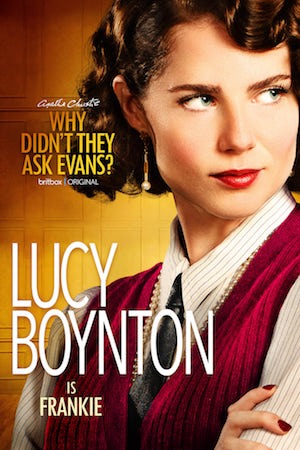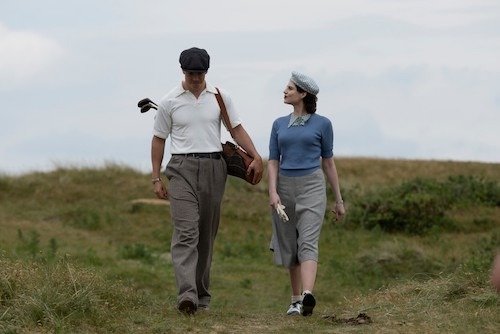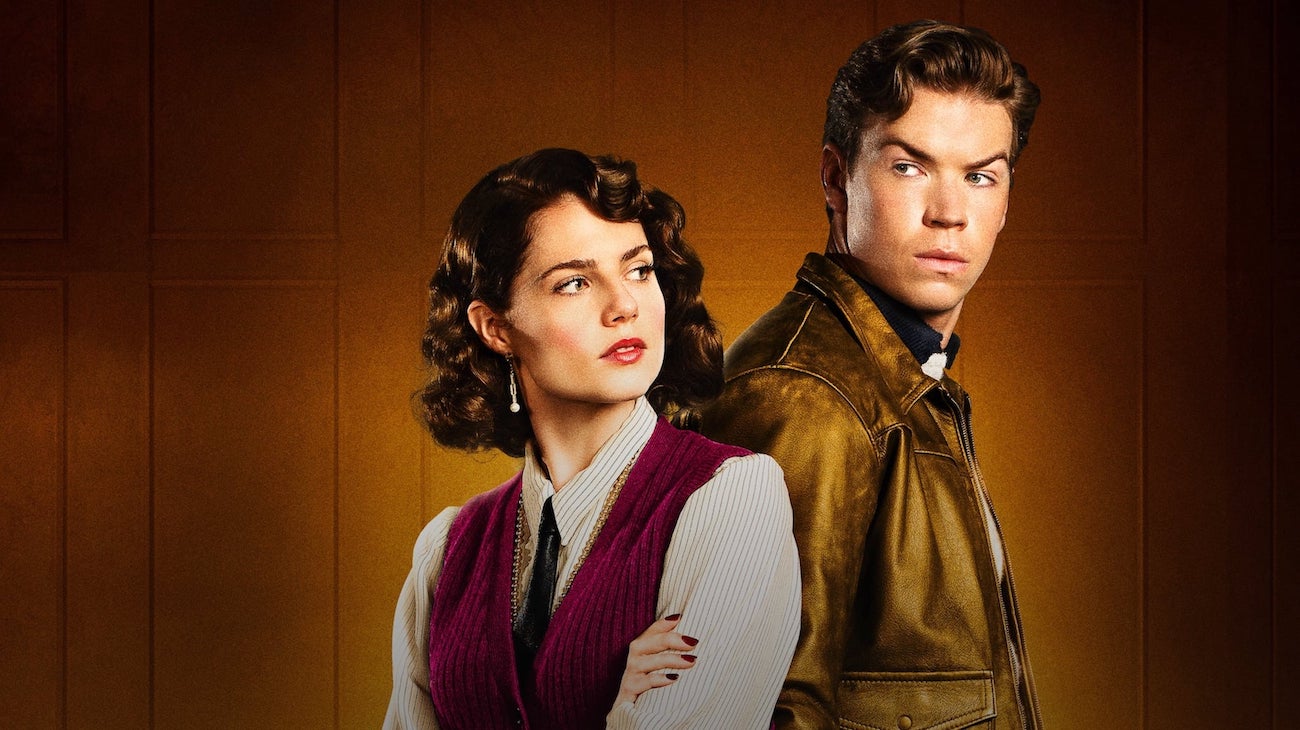
Luck of the Welsh
If one has the directing bug, a bit of money burning a hole in one's pocket, and a name that will sell a series to the BBC - for instance, Hugh Laurie - it would definitely be easy to decide to adapt an Agatha Christie novel. That's just what you do. However, it's what you pick that reveals your worthiness to adapt Christie (or, in the case of Kenneth Branagh's Death on the Nile, it reveals the producers' level of confidence in your vaingloriously costly work selling to the general public). Selecting Why Didn't They Ask Evans?, the 1934 novel that Laurie has adapted as a three-episode miniseries for BritBox, is - if nothing else, though there is indeed plenty else - an exercise in exquisite good taste. It features neither Hercule Poirot nor Miss Marple, nor even any of Christie's lesser sleuths like Colonel Race or Superintendent Battle, but it is nevertheless one of the prolific author's sparkling gems, a work that deserves far more attention than it ever garnered.
2022's Why Didn't They Ask Evans? is a reasonably faithful adaptation of said novel, opening in the Welsh town of Marchbolt, where indolent former military officer Bobby Jones (Will Poulter) is living with his father, the local vicar. While caddying at the seaside golf course, he hears a cry and discovers that a man has fallen to his death off a cliff. Bobby overhears the man's dying words, which are - of all things - "Why didn't they ask Evans?" He doesn't think much of this at first, but several attempts on his life following his disclosure of these words to supposed family members of the deceased set him off on a rip-roaring journey to solve the mystery that will throw him together with his former childhood friend, the sharp-tongued young aristocrat Frankie Derwent (Lucy Boynton), who is bored and itching for adventure.
Let me cut straight to the point. Although this project is generally well-mounted, it flat-out wouldn't work without Lucy Boynton. The actress, who has been perfectly serviceable but not a particular standout in films like Sing Street, Bohemian Rhapsody, and Branagh's Poirot debut Murder on the Orient Express, has grit her teeth and decided that it's really about time somebody appreciates what she can bring to the table. She comes screaming into Why Didn't They Ask Evans? from frame one, setting every page of the script alight in a roaring bonfire.
Every single thing that sets the show apart from other BBC adaptations of Christie is driven home by Boynton. First and foremost, the series' unusually light and effective vein of comedy is buoyed by her effervescent delivery of Frankie's tendency to hide her more negative emotions behind a series of sparkling bons mots. The other element that is somewhat unusual for Christie is the romance at the center of the story, which is more reminiscent of the author's adventurous sleuthing couple Tommy and Tuppence than any story readers may be more familiar with. Although Poulter does indeed properly fill out all the suits and various period costumes he's asked to wear and acts properly confused whenever he's presented with a new clue and whatnot, the lion's share of their chemistry is entirely Boynton's doing.

Generally, the bulk of the ensemble cast is operating at Poulter's level of "effective but not particularly unique." This also applies to Emma Thompson and Jim Broadbent in one-scene roles as Frankie's parents, alas. It does not apply, thankfully, to the men playing two of the most important suspects, Lovesick's Daniel Ings, whose peerless embodiment of the idle rich provides the character with a genuine sense of menace and unpredictability, and Hugh Laurie himself, who just knows in his bones how to be goddamn evil when he wants to be.
Ultimately, there is much more good than bad in this particular adaptation. It's certainly pretty to look at throughout, though there's only one shot or so per episode that is doing something actually visually arresting with a setup (minus the animated opening credits, which are more or less perfect). The only thing that is genuinely bad here is its tendency toward repetition. There are far too many flashbacks to Bobby discovering various clues that really beat the audience over the head with things they really should have no trouble remembering. Also there's a needle drop that recurs in each episode which might be called a motif, even an effective one, if 1) it wasn't thing single most obvious song to evoke the time period, and 2) it wasn't "Midnight, The Stars, and You," the goddamn song from the ending of The Shining, meaning that every time it plays you'll become very aware that you're not watching a masterpiece of 1980s horror cinema, which is just painful.
The pacing is also imperfect across the three episodes. The first episode certainly should have avoided staying in Marchbolt for the entire duration, considering how much of the mystery proper takes place elsewhere. This also results in the third act being too jam-packed with incident to give everything time to breathe, muddling a bit of the lead-up to the all-important scene where the mystery is solved. The second episode is the only one that's operating absolutely smoothly, introducing a fun diversion in the form of a heist movie-style planning sequence that is playfully edited in a flash of inspiration that outshines the rest of the series put together. All in all, the weaknesses are sanded over by the strengths (read: Boynton), it's just that there's not quite enough there there for me to recommend someone go running to seek out Why Didn't They Ask Evans? However, if you have had your interest piqued by a recent substandard Christie project and want to see something a little more engaging, this will certainly do right by you.
Brennan Klein is a millennial who knows way more about 80's slasher movies than he has any right to. He's a former host of the Attack of the Queerwolf podcast and a current senior movie/TV news writer at Screen Rant. You can find his other reviews on his blog Popcorn Culture. Follow him on Twitter or Letterboxd, if you feel like it.
2022's Why Didn't They Ask Evans? is a reasonably faithful adaptation of said novel, opening in the Welsh town of Marchbolt, where indolent former military officer Bobby Jones (Will Poulter) is living with his father, the local vicar. While caddying at the seaside golf course, he hears a cry and discovers that a man has fallen to his death off a cliff. Bobby overhears the man's dying words, which are - of all things - "Why didn't they ask Evans?" He doesn't think much of this at first, but several attempts on his life following his disclosure of these words to supposed family members of the deceased set him off on a rip-roaring journey to solve the mystery that will throw him together with his former childhood friend, the sharp-tongued young aristocrat Frankie Derwent (Lucy Boynton), who is bored and itching for adventure.
Let me cut straight to the point. Although this project is generally well-mounted, it flat-out wouldn't work without Lucy Boynton. The actress, who has been perfectly serviceable but not a particular standout in films like Sing Street, Bohemian Rhapsody, and Branagh's Poirot debut Murder on the Orient Express, has grit her teeth and decided that it's really about time somebody appreciates what she can bring to the table. She comes screaming into Why Didn't They Ask Evans? from frame one, setting every page of the script alight in a roaring bonfire.
Every single thing that sets the show apart from other BBC adaptations of Christie is driven home by Boynton. First and foremost, the series' unusually light and effective vein of comedy is buoyed by her effervescent delivery of Frankie's tendency to hide her more negative emotions behind a series of sparkling bons mots. The other element that is somewhat unusual for Christie is the romance at the center of the story, which is more reminiscent of the author's adventurous sleuthing couple Tommy and Tuppence than any story readers may be more familiar with. Although Poulter does indeed properly fill out all the suits and various period costumes he's asked to wear and acts properly confused whenever he's presented with a new clue and whatnot, the lion's share of their chemistry is entirely Boynton's doing.

Generally, the bulk of the ensemble cast is operating at Poulter's level of "effective but not particularly unique." This also applies to Emma Thompson and Jim Broadbent in one-scene roles as Frankie's parents, alas. It does not apply, thankfully, to the men playing two of the most important suspects, Lovesick's Daniel Ings, whose peerless embodiment of the idle rich provides the character with a genuine sense of menace and unpredictability, and Hugh Laurie himself, who just knows in his bones how to be goddamn evil when he wants to be.
Ultimately, there is much more good than bad in this particular adaptation. It's certainly pretty to look at throughout, though there's only one shot or so per episode that is doing something actually visually arresting with a setup (minus the animated opening credits, which are more or less perfect). The only thing that is genuinely bad here is its tendency toward repetition. There are far too many flashbacks to Bobby discovering various clues that really beat the audience over the head with things they really should have no trouble remembering. Also there's a needle drop that recurs in each episode which might be called a motif, even an effective one, if 1) it wasn't thing single most obvious song to evoke the time period, and 2) it wasn't "Midnight, The Stars, and You," the goddamn song from the ending of The Shining, meaning that every time it plays you'll become very aware that you're not watching a masterpiece of 1980s horror cinema, which is just painful.
The pacing is also imperfect across the three episodes. The first episode certainly should have avoided staying in Marchbolt for the entire duration, considering how much of the mystery proper takes place elsewhere. This also results in the third act being too jam-packed with incident to give everything time to breathe, muddling a bit of the lead-up to the all-important scene where the mystery is solved. The second episode is the only one that's operating absolutely smoothly, introducing a fun diversion in the form of a heist movie-style planning sequence that is playfully edited in a flash of inspiration that outshines the rest of the series put together. All in all, the weaknesses are sanded over by the strengths (read: Boynton), it's just that there's not quite enough there there for me to recommend someone go running to seek out Why Didn't They Ask Evans? However, if you have had your interest piqued by a recent substandard Christie project and want to see something a little more engaging, this will certainly do right by you.
Brennan Klein is a millennial who knows way more about 80's slasher movies than he has any right to. He's a former host of the Attack of the Queerwolf podcast and a current senior movie/TV news writer at Screen Rant. You can find his other reviews on his blog Popcorn Culture. Follow him on Twitter or Letterboxd, if you feel like it.
Categories: mysteries, television






